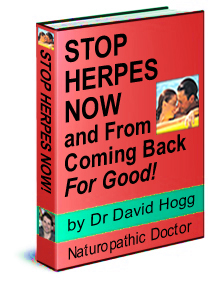Defining the Herpes Simplex Virus or HSV
STOP Herpes Now and From Coming Back for Good
>> Instantly STOP The Bloody HERPES. Click Here <<
Herpes Simplex or HSV is the name given to the diseases caused by either of the two herpes viruses - HSV 1 and HSV 2. The most common misconception that exists is that Herpes simplex is only a sexually transmitted disease. This is only partially true as herpes can affect any part of the body and most commonly affects the mouth and the genitals. HSV is defined by clusters of small water blisters or lesions. Both HSV 1 and 2 can infect anyone through contact including and especially when body fluids are exchanged through kissing, touching or sexual intercourse.
The HSV 1 and the HSV 2 have almost identical DNA strains. The defining difference lies in their preferred area of infection. While HSV 1 typically affects the area around the mouth and the lips, HSV 2 is the most common cause of genital herpes simplex.
HSV infected patients suffer from cold sores which are the defining symptom of HSV. These cold sores or blisters are often preceded by a redness and itchiness around the infected area. They are also accompanied by flu like symptoms including high fever, headaches, cold or a sore throat. Genital Herpes is defined by similar symptoms but may also be accompanied by yeast infections, muscles ache, lower back pain and infections of the urinary tract along with high fever. Both types of HSV outbreaks are often preceded by warning signs called predromal signs of an outbreak. These include redness, soreness and numbness of skin in the infected area and swelling of the lymph nodes.
The herpes simplex virus is a stubborn virus which stays in the body once it finds its way there. Housing itself in the nerves, it causes recurring outbreaks of HSV. The first or the primary attack of the HSV is the strongest as at this stage the body has not developed antigens against the herpes simplex virus. Fortunately subsequent attacks are usually milder. Recurrent attacks will more often than not occur at the same place as the first attack did. Recurrent HSV out breaks can be triggered by stress, surgical trauma, lowered immunity, other genital infections and intake of alcohol. In women at times menstruation can bring on the HSV outbreak.
When an HSV outbreak occurs it is important to keep the area clean and dry. This will speed up the healing. It is possible to infect other parts of the body by touching an unaffected area immediately after touching infected parts of the body. Therefore it is very important to avoid touching the sores till they are completely healed and not just scabbed over. Hands must be washed with soap if sores are touched.
If predromal signs indicating a HSV recurrence are felt it is important to keep this are free from skin contact with other people to avoid spreading the virus. With Oral HSV patients should not kiss or share food and clothing with other individuals. With Genital HSV sexual contact should be avoided as soon as a recurrence of HSV is observed.
There is no known cure for HSV infections caused by either HSV 1 or HSV 2. However topical drugs along with some oral drugs may reduce frequency of out breaks and also reduce the length and intensity of the out break. Pain relievers and ice packs can also help reduce discomfort from the lesions.
To learn more about the Herpes Simplex Virus visit the Herpes Simplex Virus Resource.
Noah Rider is a regular contributor on several health related issues and the natural alternatives used to treat them. You may learn more about HSV1 and HSV2 by visiting http://www.my-herpes-cure.info
Labels: acid_reflux_alternative_medicine, equine_herpes_virus, herpes_blood_test, herpes_remedy, picture_of_herpes_virus, what_cause_acid_reflux_disease

